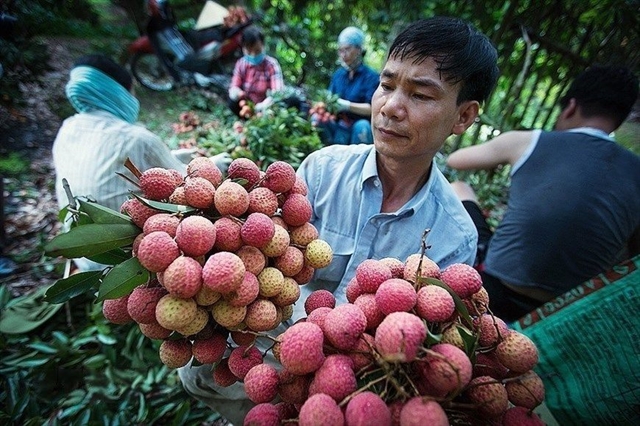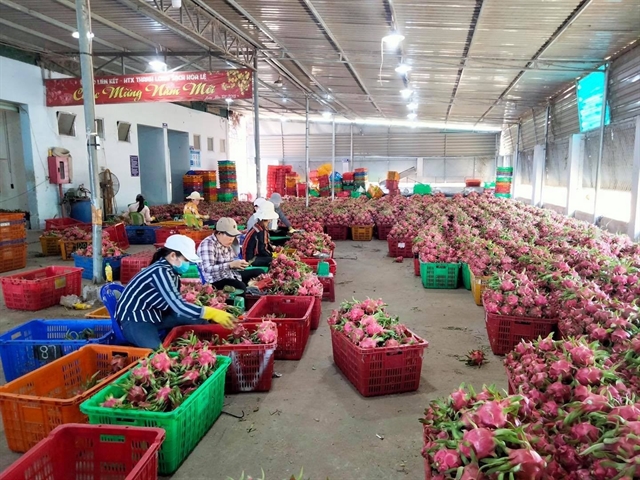For enterprises, a trademark is a way to differentiate their products from competitors' products, helping businesses build brand loyalty, set high prices and bring sustainable profits.

Domestic enterprises looking to do business in foreign countries have been reminded of the importance of registering their trademarks in foreign markets.
Ngo Viet Thang, director of the Geographical Indication and International Trademark Examination Centre under the Ministry of Science and Technology's Intellectual Property Office of Viet Nam, says enterprises need to register their trademarks in foreign countries because a trademark is an identification card of goods or services that assures consumers of the quality and authenticity of goods or services.
For enterprises, a trademark is a way to differentiate their products from competitors' products, helping businesses build brand loyalty, set high prices and bring sustainable profits, Thang says.
"A trademark is a valuable intangible commercial asset of a business. Protecting the asset is an integral part of any successful global business strategy," he says.
He says that if the trademark is not protected abroad, the enterprise could lose its trademark.
Thang says that the enterprise's goods would be counterfeited and suffer damage when a dispute occurs and a loss of trust among consumers, adversely affecting revenue and profit.
The registration of trademarks in foreign countries will assist enterprises in creating, maintaining and developing export markets against all violations, unfair competition or appropriation of competitors.
He says that it also helps businesses avoid legal problems and lawsuits, so they will be assured in carrying out production and business activities.
Real situation
Statistics showed that the number of international trademark applications of Viet Nam through the Madrid System had been increasing year by year over the last five years, except for 2021, when the number of applications decreased slightly compared to 2020 due to the impact of the COVID-19 pandemic.
However, the number of applications this year is expected to exceed previous years.
Thang says many trademarks of large Vietnamese enterprises are already registered and protected in foreign markets, such as VINSMART and Vinfast of Vingroup, BRG GROUP of the BRG Group Joint Stock Company, and TH True Milk of TH Milk Joint Stock Company.
He warns that although awareness of businesses protecting their trademark rights in foreign countries has gradually improved, many businesses still miss opportunities to register for trademark protection in foreign countries.
A number of trademarks of Viet Nam, which are already registered for protection in Viet Nam and widely used in Viet Nam cannot be registered in foreign countries because someone already registered the trademarks before, he says.
One of the main reasons is that many Vietnamese individuals and businesses do not anticipate the risk that their trademarks will be registered in advance by others in foreign markets, he says.
He says they are often slow in registering their trademarks in foreign markets.
Data from the Intellectual Property Office of Viet Nam show that domestic trademark registration is about 52,000 applications per year, but there are only about 230 applications for international trademark registration.

Guidelines
Lawyer Nguyen Ba Hoi, Chairman of the Board of Directors of AMC Viet Nam Brand Development and Consultancy Company Limited, says enterprises should first determine whether or not their products have been exported or are about to be exported in the future rather than pre-register to reserve a slot.
He says that enterprises also need to consider that their products are already available in foreign markets and then quickly register in the markets.
He also says owners of Viet Nam's collective trademarks, industrial trademarks and geographical indication trademarks are advised to hire professional consulting agencies when registering in foreign markets.
Not every owner knows the laws of each country, he says.
Regarding the form of registration, it must be according to the regulations of each different country. Sometimes a product is protected for a geographical indication in Viet Nam, but it is still very difficult to have a geographical indication in foreign markets, he says.
According to Thang, there are two ways to register a trademark in foreign markets: registering directly in the country or territory where the enterprise wants to protect its trademark or registering through the Madrid System, where Viet Nam is a member.
Compared to the direct registration method, filing an international trademark application through the Madrid System has more advantages.
For example, it only requires legal representation if there are problems. At the same time, he says it is mandatory to have a legal representative right from the time of application in the direct registration model.
The Madrid System has 112 members, covering 128 countries and territories worldwide, including major markets of South Korea, Japan, China, the United States and Singapore.
He says that the applicant only needs to submit a single application in one language for a one-time fee in one currency instead of having to submit an application in different languages and pay fees in different currencies in each country and territory.
He says that post-registration management (amendment or transfer of rights) is easier with just one request instead of having to make multiple requests and submit them in each country and territory.
Supports
At the Government meeting in April 2021, the Government assigned the Ministry of Science and Technology to coordinate with the Ministry of Agriculture and Rural Development, the Ministry of Industry and Trade and relevant agencies to take measures to support the registration and protection of Vietnamese trademarks in foreign markets, especially for goods in potential markets.
On that basis, on December 31, 2021, the three ministers signed Plan No. 3926/KH-BKHCN-BCT-BNNPTNT on coordinating support for the protection of trademarks and geographical indications for potential export products of Viet Nam in foreign countries in the period 2022-25.
As an agency under the ministry of science and technology, the Intellectual Property Office of Viet Nam has been regularly trained and consulted for enterprises to establish, exploit and protect intellectual property rights not only in Viet Nam but also in foreign countries, Thang says.
As the focal point for receiving, processing and submitting applications to the World Intellectual Property Organisation (WIPO), the agency has always created favourable conditions for applicants to early complete their registration documents, he says. — VNS





